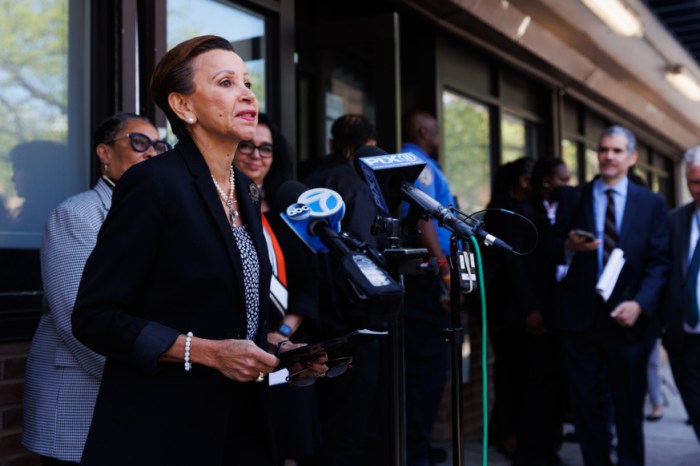
Congresswoman Nydia Velázquez (File Photo by Paul Frangipane)
Jan. 10, 2024 By Shane O’Brien
U.S. Rep Nydia Velázquez has introduced a new bill aiming to protect tenants from “unscrupulous” landlords, creating new violations under federal law for discrimination based on a tenant’s source of income.
The Landlord Accountability Act of 2025, the first bill introduced by Velázquez in the 119th Congress, would allow tenants to seek remedies against landlords who discriminate against them based on their income source.
Velázquez represents New York’s 7th Congressional District, which encompasses diverse communities across parts of Brooklyn and Queens. The district includes neighborhoods such as Bushwick, Williamsburg, Ridgewood, and Astoria, many of which face significant housing challenges, making tenant protections and affordable housing key priorities in her legislative agenda.
The law would target any landlord discriminating against tenants receiving assistance through Section 8, a federally funded program that helps low-income tenants pay rent and buy houses.
It would also penalize landlords who discriminate against tenants receiving income from any form of federal, state, or local housing assistance program, including rental assistance, down payment assistance, homeowner assistance, or guarantees provided through government and non-government organizations.
Any landlord found discriminating against tenants receiving Social Security, spousal, child, or other court-ordered support, or any payment from a trust would also be liable for penalties.
The Landlord Accountability Act would additionally fine landlords who take actions to disqualify units from federal housing programs, such as making the property unsafe or uninhabitable. Landlords could be fined up to $100,000 for violations and could receive a second set of fines up to $50,000, with revenue going to aggrieved tenants.
Under the new law, landlords who engage in “warehousing,” a practice where they intentionally keep rent-stabilized units off the market to encourage tenants to vacate or combine units and charge tenants higher rent, would also face new penalties.
Velázquez said warehousing apartments drive up housing costs and fuel affordable housing scarcity in the city, pointing to reports stating that 26,000 units were kept off the market in 2023.
Landlords who intentionally hold a unit that is available to rent for more than 60 days would face a civil monetary penalty of $100,000, with an additional $100,000 fine for every 30-period that the unit is intentionally left vacant thereafter.
In a statement, Velázquez said the “unscrupulous practices” of certain landlords had helped exacerbate the city’s housing crisis.
“Landlords who prioritize profit over people by forcing families and seniors out of Section 8-eligible housing must be stopped and held accountable,” Velázquez said in a statement. “As homelessness is on the rise nationwide, addressing the housing crisis must be a priority for this Congress. That’s why this is the first bill I’ve introduced in the 119th Congress, and I’m hopeful my Republican colleagues will join me in tackling this urgent issue.”
2 Comments

Instead of punishing landlords for warehousing apartments, the city should reinstate the incentives that would allow landlord to renovate their apartments and bring them into market. Those incentives were taking away in 2019.
If you have a long term tenant leave, the apartment will most likely need extensive costly renovations. If the apartment is stabilized, it will take many many years for the landlord to recoup his investment. That’s why they are leaving the apartments empty. You can’t expect a landlord to spend 150k-200k renovating an apartment and be forced to rent it at a rent very well below market rate.
As for those who say “why hasn’t the landlord been renovating the apartment and fixing everything before the old tenant vacated?”….Many tenants to not consent to the landlord replacing a kitchen or bathroom because they either don’t want to deal with the inconvenience or are afraid the landlord would raise their rent. I am a landlord and have seen this played out many times.
It is not discrimination to not rent to people with no means of supporting themselves save for a government program, it just common sense.